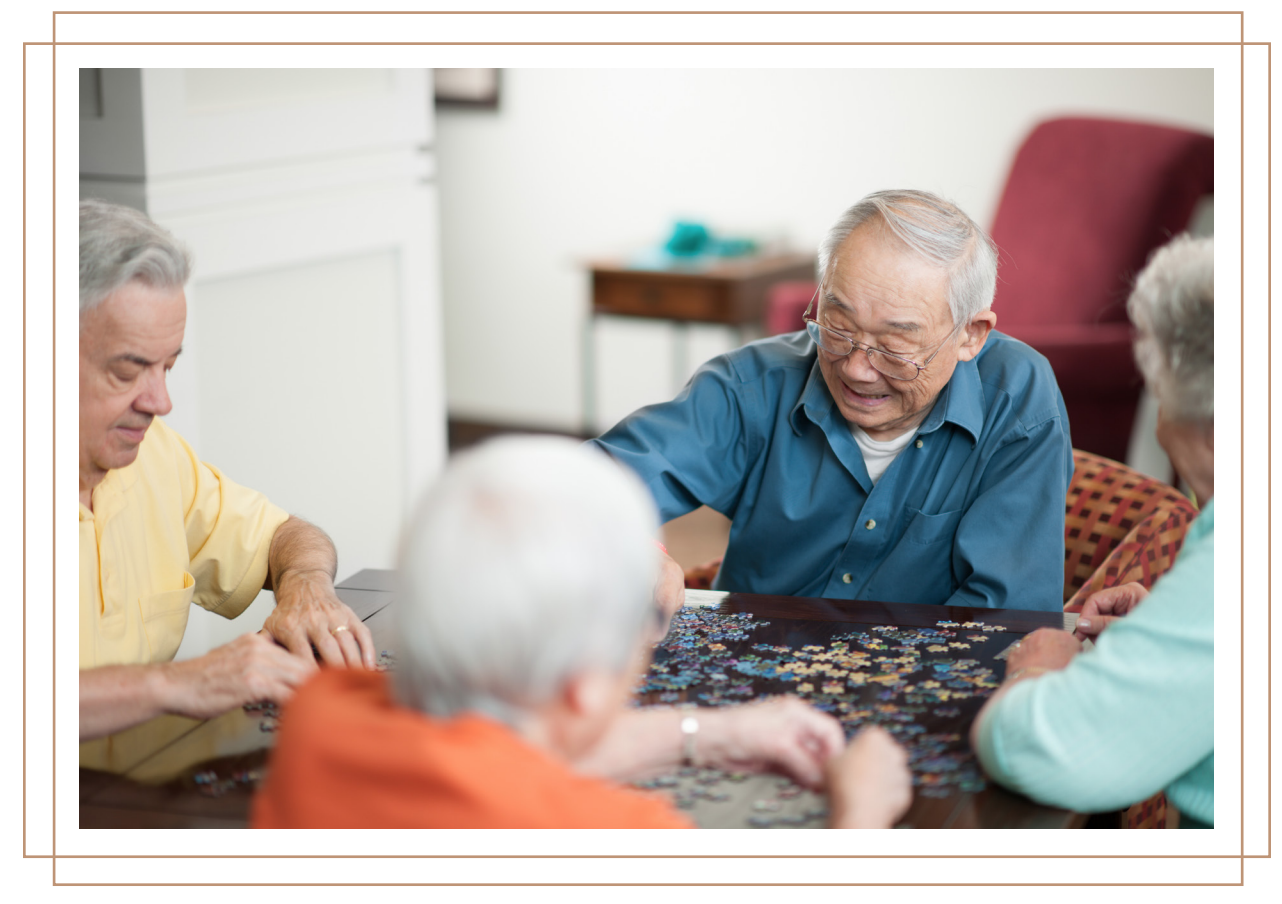Alzheimer’s and other forms of dementia can be challenging for everyone involved, causing you to feel a range of emotions and to ask yourself questions about what is going to happen to your loved one’s health and what happens when it becomes too overwhelming to take care of them at home.
The more you know about what to expect and how to prepare, the more it can make the journey feel less daunting. And you don’t have to go through this alone. When you start to feel like you need outside assistance, memory care and dementia communities are wonderful environments where seniors can lead meaningful and enjoyable lives — and you can experience peace of mind.
This guide will look at everything you need to know — from signs it’s time to start exploring your options to how to find a quality community and questions to ask when touring.
Memory care is a special kind of care provided to those with varying degrees of dementia. Also called Alzheimer's special care units or dementia care communities, these residential facilities are designed to meet the specific needs of individuals with Alzheimer’s and other dementias.
They can take many forms and exist within various types of residential care, including assisted living communities, but typically include trained staff, specialized activities, and the ability of staff to care for residents with behavioral needs.
Although assisted living communities may have memory care units on campus, the two types of care are not synonymous. Memory care is a distinct form of long-term skilled nursing that specifically caters to patients with dementia and other types of memory problems.'
Both memory care and assisted living offer basic supervised care; medical monitoring; help with daily activities such as dressing, mobility, and hygiene; nutritious meals; housekeeping; laundry; transportation; and more. But memory care communities often offer additional structured activities or programs designed to nurture residents with Alzheimer’s or dementia.
Memory care services are beneficial not only to people with dementia but also to their families. Knowing that your loved one has trained 24-hour care gives families peace of mind and helps relieve the caregiving burden.
Memory care and dementia communities have specific features in place to keep residents safe.
For example, memory care units do not have individual kitchens for their residents, and they put an extra emphasis on security to prevent patients from wandering, which is common in those with more advanced dementia. Additionally, some communities offer an outdoor enclosed courtyard so residents can explore without getting lost.
Because memory care is a specialized treatment option for those who suffer from dementia, the communities report many improvements in resident safety factors, including fewer emergency room visits, fewer incidents involving violent behaviors, and reduced medication and medication side effects.
The staff at quality memory care communities are specially-trained professionals who receive initial and ongoing training so they understand how the disease manifests, why dementia patients may exhibit disruptive behavior, how to respond to it, and how to communicate with individuals with dementia. Additionally, memory care units usually require a higher staff-to-patient ratio to adequately provide the care needed for one with dementia.
Whether it’s nighttime wandering, confusion, repetitive questions, incontinence or just wanting “to go home,” the staff at memory care and dementia communities should understand and have the expertise to handle these concerns.
Recently, training has moved from an impairment-based practice to an abilities-based practice, which empowers memory care staff to provide person-centered care. Specialized care and service programming should be centered around a resident’s unique needs, preferences, abilities, and interests.
Because individuals with dementia may easily become stressed and confused, there is a special emphasis on creating a relaxing environment in memory care units. The hallways might be color-coded to assist with navigation and reduce anxiety in residents. Additionally, many communities look similar to private homes with areas that residents can perform normal, everyday activities.
Social engagement and involvement in meaningful activities is one of the critical elements of good dementia care. In addition to leisure programs, therapeutic activities that address memory impairment, wandering, and other common dementia behaviors help residents maintain their functional abilities and can enhance quality of life. These stimulating activities help stir memories, foster emotional connections with others, encourage self-expression, lessen the anxiety and irritability that dementia may bring, and make people with Alzheimer’s feel more engaged with life.

Dementia is a progressive brain disease, which means it worsens over time. Although it affects people in different ways, it typically progresses through three general stages: mild (early-stage), moderate (middle-stage), and severe (late-stage).
In the early stage of dementia, a person may function independently. They may still drive, work, and be part of social activities while also experiencing forgetfulness, losing or misplacing things, and having difficulty finding the right words. Although it is not uncommon to occasionally experience these memory problems as one ages, they become disturbing when they occur more frequently and begin to interfere with the individual’s daily life and activities.
In this stage — typically the longest stage — individuals are more likely to experience increased confusion, greater memory loss, and worsening judgment. It’s during this stage that they’re likely to begin to need more assistance. You might notice that they need help with basic daily tasks, such as dressing, bathing, and grooming, and experience changes in sleep patterns as well as in their personality and behavior even though they may still remember significant details about their life.
In the final stage of the illness, declines in physical functioning begin to parallel the declines in cognitive functioning. Individuals may need round-the-clock assistance with daily activities and personal care, lose awareness of recent experiences as well as of their surroundings, experience changes in physical abilities, have increasing difficulty communicating, and become vulnerable to infections, especially pneumonia.
Over time, not only may caregivers begin to feel their loved ones have more specialized needs that aren’t being met, but also they may indicate substantial emotional, financial, and physical difficulties personally from the devastating toll dementia takes on caregivers.
A good rule of thumb is that there is no downside to moving into memory care too soon. However, there are many drawbacks to waiting too long. If your loved one requires a higher level of care but you decide to wait, the number of things that can potentially go wrong are endless.
The questions below may be helpful when determining if a move to residential care a good option:
If you answer yes to any of these questions, it is time to start visiting memory care and dementia communities.

When choosing a memory care community, there are a number of factors to consider, including the staff, the community, the programs, and the type of treatment residents receive. What’s most important is that you find a care community that is closely aligned with their needs.
To determine this, you’ll need to plan on visiting several care communities, keeping in mind you may see some things that might make you uncomfortable. Here are some tips.
Does the community feel fresh and clean? Look past the furnishings and into the corners, baseboards, and windows. Resident rooms should be clean and spacious, and the facility should be free of unpleasant odors. Ask how often housekeeping is provided in personal living spaces. Get full details on the types of maintenance provided and the estimated response times. Don’t forget to ask if residents are allowed to bring familiar items with them, such as photos, bedding, and a chair.
It’s a good idea to try and schedule your tour in conjunction with a community event. Ask if you can watch the activities or even participate. Are the activities and events well-attended? Does the staff seem to be enjoying the activity as well? If you can’t visit during a planned activity, ask to see the activity schedule and take a look at the community calendar of events. Do they match your loved one’s interests? Do they include trips and outings away from the community?
The attitude and friendliness of the staff are critical. Make sure that you observe several staff members interacting with current residents. Do they recognize persons with dementia as unique individuals? Is care personalized to meet specific needs, abilities, and interests? Make sure to get a good understanding of the staffing pattern. How many people are actually involved in residents’ care? Can staff handle challenging behaviors? What is the ratio of residents to staff?
When visiting communities, it is important to discuss meal choices and learn about dining hours, options, and procedures. Are the staff able to provide for any special dietary needs? Can they provide appropriate assistance based on person’s abilities, such as encouragement during meals or assisted feeding in advanced stages? If you can, enjoy a meal at the property. Not only is it a great way to ensure the food is appetizing and the dining environment is pleasant, but it also opens up a great opportunity to meet some of the residents.
Ask residents and families for their honest opinions about the community. Are they encouraged to participate in care planning? Are families informed of changes in their loved one’s condition and care needs? Don’t forget to ask to see the latest survey or inspection report, which facilities are required to provide. The report and the disclosure form can give you a picture of the facility’s services.
If you were happy with the scheduled tour, make one or two unannounced visits, too, to confirm the atmosphere is as positive as it was during your scheduled visit.
Here are some questions the Alzheimer’s Association recommends asking to help make the decision easier.
